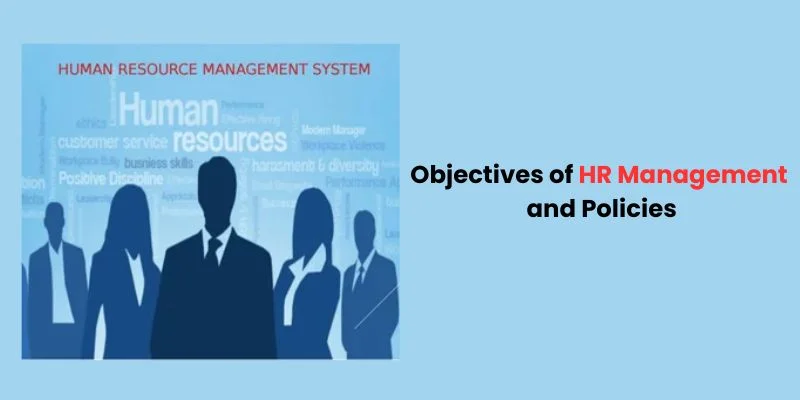
HRM plays a crucial role in shaping organizational achievement by effectively managing the most valuable asset: human capital. With its multifaceted approach, HRM aims to align individual goals with organizational objectives, foster employee engagement and development, and create a positive work culture. In this blog, we’ll delve into what are the objectives of HRM, both at the organizational and functional levels, and explore the significance of HR policies in achieving these objectives.
What are the Objectives of HRM?
The objectives of HRM encompass a wide range of goals and priorities aimed at maximizing employees’ potential and enhancing organizational performance. Some of the key objectives include:
Attracting and Retaining Talent
HRM aims to attract top talent by implementing effective recruitment and selection strategies. Furthermore, HRM aims to keep important staff members by providing them with possibilities for professional growth, attractive benefits packages, and a happy workplace. An MBA Digital Marketing in Chennai equips professionals with the skills to integrate digital marketing techniques into HRM practices, enhancing recruitment and employee engagement initiatives in the modern workplace.
Developing Human Capital
HRM focuses on developing employees’ skills, knowledge, and capabilities through training, development, and performance management programs. By making investments in employee development, HRM enables people to realize their greatest potential and make more meaningful contributions to organizational objectives of HRM.
Promoting Employee Engagement
Employees that are involved in work are more dedicated, effective, and content with their jobs. HRM works to increase employee engagement by providing chances for participation in decision-making, frequent feedback, and recognition initiatives.
Ensuring Compliance with Laws and Regulations
HRM is critical in ensuring labor laws, regulations, and industry standards compliance. This includes addressing equal employment opportunity, diversity and inclusion, workplace safety, and labor relations.
Managing Organizational Change
In today’s dynamic business environment, organizational change is inevitable. HRM helps organizations effectively manage change by facilitating communication, providing support to employees, and implementing change management strategies.
Organizational Objectives of HRM
At the organizational level, HRM aims to contribute to achieving broader organizational goals and objectives. Some of the organizational objectives of HRM include:
Supporting Business Strategy
HRM aligns its strategies and initiatives with the organization’s overall business strategy. By understanding the organization’s strategic direction, HRM can develop HR policies and practices that support and enhance business performance.
Enhancing Organizational Performance
HRM is key to enhancing organizational performance by ensuring people are in the right roles, developing their skills and capabilities, and creating a high-performance and accountable culture.
Fostering Innovation and Creativity
HRM encourages innovation and creativity by fostering a culture of continuous learning, experimentation, and idea-sharing. HRM fosters a collaborative and encouraging work atmosphere that encourages innovation and helps the organization succeed.
Functional Objectives of HRM
At the functional level, HRM focuses on specific areas of HR practice to achieve organizational objectives. Some of the functional objectives of HRM include:
Recruitment and Selection
HRM seeks to draw in, hire, and choose competent applicants who most closely match the requirements and culture of the company. This involves developing effective recruitment strategies, conducting interviews, and evaluating candidates to ensure a successful match.
Training and Development
HRM is responsible for identifying training and development needs within the organization and designing programs to address those needs. This may include technical skills training, leadership development, and employee orientation programs.
Performance Management
HRM oversees performance management, including setting goals, providing feedback, and evaluating employee performance. By effectively managing performance, HRM helps to improve individual and organizational performance.
Compensation and Benefits
HRM develops and administers compensation and benefits programs that are competitive, equitable, and aligned with organizational goals. Salary structures, incentive programs, and employee perks like health insurance and retirement plans fall under this category. An MBA in Business Analytics in Chennai equips HRM professionals with the analytical skills to analyze compensation and benefits data effectively, enabling them to make data-driven decisions in designing and administering competitive and equitable compensation packages that align with organizational goals and enhance employee satisfaction and retention.
Objectives of HR Policies
HR policies serve as guidelines and standards for HR practices within the organization. The objectives of HR policies include:
Ensuring Compliance
HR policies help ensure compliance with laws, regulations, and organizational standards by providing clear guidelines and expectations. They also help minimize legal and regulatory risks.
Promoting Consistency
HR policies promote consistency and fairness in HR practices across the organization. By establishing clear standards and procedures, HR policies help ensure that decisions are made consistently and equitably.
Supporting Organizational Goals
HR policies are designed to support and align with organizational goals and objectives. By providing direction and guidance to employees, HR policies help ensure that HR practices are aligned with organizational priorities.
Protecting Employee Rights
HR policies help protect employees’ rights and interests by establishing clear expectations and procedures. This includes policies on equal employment opportunity, harassment and discrimination, and employee privacy.
The objectives of HR policies are intertwined with the overarching goal of fostering organizational success and maximizing the potential of human capital. HRM is critical in driving organizational performance and achieving strategic goals by aligning individual goals with organizational objectives, promoting employee engagement and development, and ensuring compliance and consistency in HR practices. Many prominent MBA Colleges in Chennai specialize in Human Resource Management. With a clear understanding of these objectives, organizations can develop HR strategies and policies that support a positive work culture, attract top talent, and enhance overall business performance.
Authored by Priya S.
I’m interested in learning about the newest developments in business and technology fields. Connect with me on LinkedIn to know about starting a fulfilling career.
